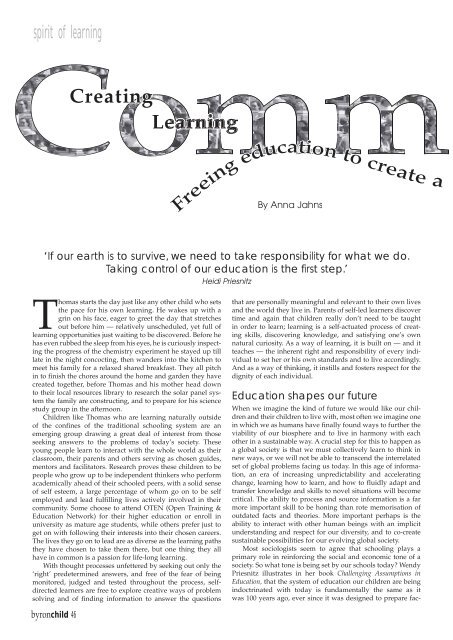byronchild - logo
byronchild - logo
byronchild - logo
You also want an ePaper? Increase the reach of your titles
YUMPU automatically turns print PDFs into web optimized ePapers that Google loves.
spirit of learning<br />
Thomas starts the day just like any other child who sets<br />
the pace for his own learning. He wakes up with a<br />
grin on his face, eager to greet the day that stretches<br />
out before him — relatively unscheduled, yet full of<br />
learning opportunities just waiting to be discovered. Before he<br />
has even rubbed the sleep from his eyes, he is curiously inspecting<br />
the progress of the chemistry experiment he stayed up till<br />
late in the night concocting, then wanders into the kitchen to<br />
meet his family for a relaxed shared breakfast. They all pitch<br />
in to finish the chores around the home and garden they have<br />
created together, before Thomas and his mother head down<br />
to their local resources library to research the solar panel system<br />
the family are constructing, and to prepare for his science<br />
study group in the afternoon.<br />
Children like Thomas who are learning naturally outside<br />
of the confines of the traditional schooling system are an<br />
emerging group drawing a great deal of interest from those<br />
seeking answers to the problems of today’s society. These<br />
young people learn to interact with the whole world as their<br />
classroom, their parents and others serving as chosen guides,<br />
mentors and facilitators. Research proves these children to be<br />
people who grow up to be independent thinkers who perform<br />
academically ahead of their schooled peers, with a solid sense<br />
of self esteem, a large percentage of whom go on to be self<br />
employed and lead fulfilling lives actively involved in their<br />
community. Some choose to attend OTEN (Open Training &<br />
Education Network) for their higher education or enroll in<br />
university as mature age students, while others prefer just to<br />
get on with following their interests into their chosen careers.<br />
The lives they go on to lead are as diverse as the learning paths<br />
they have chosen to take them there, but one thing they all<br />
have in common is a passion for life-long learning.<br />
With thought processes unfettered by seeking out only the<br />
‘right’ predetermined answers, and free of the fear of being<br />
monitored, judged and tested throughout the process, selfdirected<br />
learners are free to explore creative ways of problem<br />
solving and of finding information to answer the questions<br />
<strong>byronchild</strong> 46<br />
Creating<br />
Learning<br />
to to create create<br />
education<br />
education a a<br />
Freeing<br />
Freeing<br />
By Anna Jahns<br />
‘If our earth is to survive, we need to take responsibility for what we do.<br />
Taking control of our education is the first step.’<br />
Heidi Priesnitz<br />
that are personally meaningful and relevant to their own lives<br />
and the world they live in. Parents of self-led learners discover<br />
time and again that children really don’t need to be taught<br />
in order to learn; learning is a self-actuated process of creating<br />
skills, discovering knowledge, and satisfying one’s own<br />
natural curiosity. As a way of learning, it is built on — and it<br />
teaches — the inherent right and responsibility of every individual<br />
to set her or his own standards and to live accordingly.<br />
And as a way of thinking, it instills and fosters respect for the<br />
dignity of each individual.<br />
Education shapes our future<br />
When we imagine the kind of future we would like our children<br />
and their children to live with, most often we imagine one<br />
in which we as humans have finally found ways to further the<br />
viability of our biosphere and to live in harmony with each<br />
other in a sustainable way. A crucial step for this to happen as<br />
a global society is that we must collectively learn to think in<br />
new ways, or we will not be able to transcend the interrelated<br />
set of global problems facing us today. In this age of information,<br />
an era of increasing unpredictability and accelerating<br />
change, learning how to learn, and how to fluidly adapt and<br />
transfer knowledge and skills to novel situations will become<br />
critical. The ability to process and source information is a far<br />
more important skill to be honing than rote memorisation of<br />
outdated facts and theories. More important perhaps is the<br />
ability to interact with other human beings with an implicit<br />
understanding and respect for our diversity, and to co-create<br />
sustainable possibilities for our evolving global society.<br />
Most sociologists seem to agree that schooling plays a<br />
primary role in reinforcing the social and economic tone of a<br />
society. So what tone is being set by our schools today? Wendy<br />
Priesnitz illustrates in her book Challenging Assumptions in<br />
Education, that the system of education our children are being<br />
indoctrinated with today is fundamentally the same as it<br />
was 100 years ago, ever since it was designed to prepare fac-


